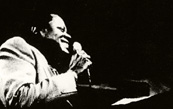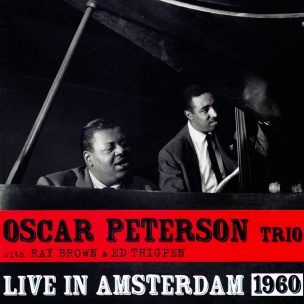
_______________________________________________________________
Oscar Peterson Trio
Live In Amsterdam 1960
_______________________________________________________________
Gerade ist eine neue Oscar Peterson-CD erschienen. Es handelt sich um
einen Live-Mitschnitt aus dem Jahre 1960. Das Konzert war Teil der
JATP-Tour, die mit 3 großen Gruppen unterwegs war:
The Miles Davis Quintet
The Oscar Peterson Trio and
The Stan Getz Quartet
A.v. Kampen hat den Auftritt miterlebt und erinnert sich, dass dieses
Konzert erst nach 24.00 Uhr begann und nicht vor 4:00 Uhr endete.
Nachfolgend lesen Sie seine Rezension:
______________________________________________
Oscar Peterson Trio Live in Amsterdam, 1960
(Solar Records 4569919)
The "Golden Years of Jazz” were most certainly, the years around 1960.
Many great jazz groups were in full flight: The Modern Jazz Quartet, The Count Basie Orchestra, The Dave Brubeck Quartet, The Miles Davis Quintet, The Duke Ellington Orchestra, The Erroll Garner Trio, Art Blakey & his Jazz messengers and of course”: The Oscar Peterson Trio.
I was lucky to grown up in those years, lived in Amsterdam and changed my love for music from early rock and roll (Bill Hailey, Elvis Presley, Everly Brothers, etc.) to jazz, while I was in high school. The Concertgebouw, now "Royal” Concertgebouw, had always been the temple for classical music.
But that changed around 1952 when the famous "Jazz At The Philharmonic”- groups (JATP) visited the Netherlands for the very first time, during an European tour, that also crossed Germany.
Of course being still in school, I had to beg for money for many weeks, to get enough to buy a ticket for these jazz concerts. Other point: I had to ask for permission, because almost all of the concerts in Amsterdam, started around midnight, meaning that I would come home very late, or early in the morning. The reason for that was that most often these concerts were performed twice. From 20.00 p.m. in Scheveningen (close to The Hague) and after that a jazz group would drive to Amsterdam fast, to start there (mostly after) midnight.
I vividly remember these 1960 concerts, because of the posters in town showed that in April the JATP-group was visiting, and that the group had an "All Star” line up with: The Miles Davis Quintet, The Oscar Peterson Trio and The Stan Getz Quartet.
The day the ticket shops were open, long lines of people were already standing there, and after several hours the Concertgebouw was completely sold out. I was lucky to even get a ticket (together with a good friend). No wonder because this was not only a great concert, in fact it were three concerts by the most famous jazz groups in the world!
A year earlier, in 1959, The Miles Davis group had recorded the now
legendary "Kind of Blue” album, but also "Take Five” was
recorded by the Dave Brubeck Quartet, the famous "Concert by the
Sea” by the Erroll Garner Trio was out, and hits of Art Blakey & his
Jazz messengers, like "Moanin’” and "Justice” made jazz a very
hip thing for youngsters.
When we got to the concert, I remember an audience that had visited a
classical concert that evening, just left the Concertgebouw, wondering
what all these people were coming to.
The Miles Davis Quintet, in 1960 still with famous saxophonist John Coltrane, started the concert, and I remember they did versions of "So What” and "All Blues” during a fine first set.
Next in line was the Oscar Peterson Trio and many wondered how only a trio would hold up against that famous Miles Davis group. Announced by impresario Norman Granz, first Ed Thigpen came down the long stairs, that are typical for the Concertgebouw. He took a bow and started playing his drum set. After that the long and most famous of bassists: Ray Brown came down and joined Ed Thigpen. But the applause went up, when the leader of The Trio came down.
Oscar Peterson, long (1.90 m.), still slender and built like an athlete came on stage, took a bow, gave us all one of his famous smiles and started in a dark mood with "Jordu”, that had, after the melody was introduced, a great bass solo to begin with. Obvious Ray was in great shape!
The rhythm changed after the break and Oscar started swinging hard, making it clear he was in great shape too. What a way to start the concert!
The next tune started by a "talk” of give and take, between Ed
Thigpen with bongo sounds and Oscar in "Cubano Chant” that was
swinging even faster than the first song.
By now the audience of thousands were already swinging and moving.
After another great solo of Ray Brown, a part of the audience was
already on their feet.
Many of the songs played that evening were tracks of recent albums of
the Oscar Peterson Trio: "The Jazz Soul of Oscar Peterson”,
"Porgy and Bess” and their latest and first with orchestra:
"Swinging Brass”. But Oscar went on, with "rim shots” by
"Thags” (the nickname of Ed Thigpen) after him and ended this one
after some eight minutes. The mood changes completely in "Con Alma”
that starts almost classical, and rather difficult, with Ray on bowed
bass. The theme is lovely and something of a waltz, but rather complex
with several rhythms. Oscar brings the song to a strange climax and
switches to the blues and later in to swing.
The tense is high with that strange rhythm under Oscar’s virtuoso runs, but here The Trio demonstrates why it is a real Trio, a complete homogeneous group, with their musical "Three Musketeers” feeling: all for one, one for all.
From their fine "Porgy and Bess” album comes "It ain’t necessary so”. Oscar plays the melody, but the timing of Ray underneath him is impeccable. This turns into one of those fine medium swingers I just can’t resist. At a certain moment Oscar and Ray play this close and together, you just can’t believe your ears, while "Thags” is doing great, behind the two masters.
"Woody’n’you” is a tune dedicated to the great leader of a famous orchestra: Woody Herman, and is on two of the records I mentioned earlier. It starts very fast, even faster than on the albums. Ed and Ray have some problems to hold the crazy tempo that Oscar is delivering.
"Blues for Big Scotia” is dedicated to Oscar’s first wife, and O.P. also composed the tune. "Big Scotia” was the nickname that Ray Brown gave her. Not that she was a fat lady, but every time Ray visited the Peterson’s during those years, Oscar’s wife was pregnant, and she gave him five children. Since she was from Nova Scotia, Ray invented the name "Big Scotia”.
Of course this is a very fine tune, and although this version is great, the definitive version of it is certainly on "The London House Sessions” (see that chapter).
"Maidens of Cadiz” is a fine ballad, that both Miles Davis (on "Sketches of Spain”) and Oscar Peterson (on "The Jazz Soul of ") recorded during the same period. Oscar’s classical background (he studied at a conservatory) is obvious, and how delicate he handles this tune, with the great Ray Brown to fill in the part, where Miles needed the complete orchestra of Gil Evans.
After some 4 minutes, the mood changes completely and Oscar, very inspired, is a powerhouse of inventions, followed all the way by the greatest bassist ever lived.
After an hour it’s time to end the concert and get Stan Getz on stage.
The Trio ends however very fast with "Daahoud”, a finger-breaker and taken at impossible speed.
Many in the audience are shaken their heads in disbelieve, even when Ray Brown takes a fast bass solo.
"Thags” gets some breaks too, and Oscar brings the concert to a rousing end and the audience to a standing ovation. What a concert!
Thanks to Dutch VARA Radio, that recorded this concert, the sound is very good, and the great bass solo’s of Ray Brown, often not well recorded, too.
_______________________________________________________________

weiter
zu Arnold van Kampens Nachruf
In Memoriam Richard
Palmer
(1947 – 2014)
_______________________________________________________________

